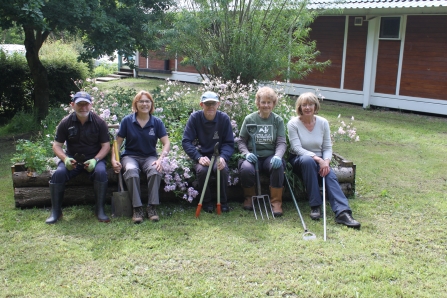
The St Nix Gardening Group volunteers who recognise the health benefits of volunteering. Image by: Fiona Dryden.

The St Nix Gardening Group volunteers who recognise the health benefits of volunteering. Image by: Fiona Dryden.
Researchers at Leeds Beckett University analysed the social value of Wildlife Trusts’ nature conservation projects that offer outdoor volunteering opportunities and programmes that support people experiencing problems such as anxiety, stress or mild depression.
The report draws on the conclusions of three years research which found that people participating in both sorts of outdoor nature conservation activities felt significantly better, both emotionally and physically, as a result. They needed, for example, fewer visits to GPs or felt more able to get back into work.
The new report: Social return on investment analysis of the health and wellbeing impacts of Wildlife Trust programmes calculates the social return on investment for every £1 invested in the two types of Wildlife Trust projects and found that they are excellent value:
Mike Pratt, Northumberland Wildlife Trust Chief Executive says: “Evidence shows that nature volunteering or taking part in a more specialised health and nature project really works. People who have low levels of wellbeing feel healthier and happier when they’re connected to wildlife and wild places.
“I would like to see the concept of nature on prescription becoming a core part of the National Health Service (NHS) mental wellbeing programmes. This new report shows the enormous value of a natural health service. It’s also important to have more investment into outdoor volunteering offered by all UK wildlife trusts which has been proven to improve mental, physical and social wellbeing.
“In addition, we need many more wild, natural places near to where people live and work - that way, green prescribing can be rolled-out everywhere. This would help the NHS save money - as well as help nature to recover.”
Anne-Marie Bagnall, Professor of Health & Wellbeing Evidence, Director of the Centre for Health Promotion Research, Leeds Beckett University says: “Our analysis of the impacts on people taking part in Wildlife Trusts’ nature conservation activities shows an excellent social return on investment for people with all levels of wellbeing.
“We can therefore say with confidence that, based on evidence from independent research, these programmes can be effective in both maintaining good wellbeing and tackling poor wellbeing arising from social issues such as loneliness, inactivity and poor mental health. The significant return on investment of conservation activities in nature means that they should be encouraged as part of psychological wellbeing interventions.”
Dr Amir Khan, GP and Health Ambassador for The Wildlife Trusts says: “There is a clear need to invest in nature-based services so that more people can benefit. If more people could access nature programmes I believe that we would see a knock-on effect in our GP surgeries, with fewer people attending for help with preventable or social problems arising from being cut off from others, not getting active or having a purpose.”